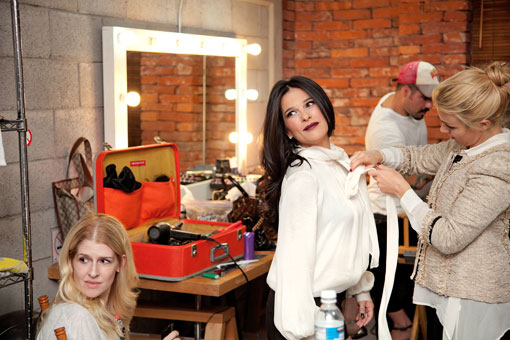When Mexican media personality Martha Debayle gave birth to her first child 16 years ago, like many new moms, she felt “clueless about what it meant to be a mother.” To make things worse, when she looked for information in the media about parenthood, all she found were clichés and patronizing language. Other parents might have given up and muddled through on their own; Debayle turned her frustration into a multimedia empire. BBMundo (“Baby World”), which she founded as a web startup in 2000, is now the destination of choice for 680,000 Mexican mothers and mothers-to-be eager to learn about reproductive and prenatal health and child-rearing.
Debayle, now 44, had worked in Mexican radio and television since the age of 18. She was especially irritated by media stereotypes that assumed mothers only wanted to talk about diapers and strollers. “I thought there must be other women like me,” she recalls. In 1997, Debayle persuaded executives at Televisa, Mexico’s biggest media group, to air “bbtips,” a 20-minute morning television segment. Her hunch paid off: ratings of the program soared, and in three years viewership grew to 1 million.
Debayle soon set her sights on the growing Internet phenomenon. She used her credit card to buy a web domain, and in September 2000 launched www.bbmundo.com with the slogan “Inspired by love, guided by knowledge.” Despite limited financing and limited traffic at first, Debayle turned down purchase offers from Televisa, Grupo Bursátil and Kimberly Clark-Mexico. “I knew that if I sold, I would lose control of the philosophy that I wanted the company to abide by,” she explains.
Debayle’s quest for independence led her to formulate a unique business model. Instead of selling ads, Debayle offered companies like Nestlé and Gerber space on bbmundo.com through “micro-sites”—essentially, individual pages on the site where they could post information about pregnancy and parenting.
To ensure editorial independence, BBMundo would check all content before it was posted, and would reserve the right not to publish material it judged unreliable, and to post competing views.
Advertisers bought into it. Today, BBMundo has over 60 clients, including pharmaceutical giants like Sanofi, kid-friendly brands like Disney, and consumer and food product companies like Froot Loops.
The brand has expanded to multiple media platforms: what originated as a TV segment and morphed into a website is now a print publication, radio talk show and iPad application. Revista BBMundo, a lavishly illustrated monthly magazine, has a monthly circulation of 40,000. “Martha Debayle en W,” a daily three-hour radio program, has 600,000 listeners. There’s also “bbcard,” through which users receive discounts on everything from diapers to doctor’s appointments.
And the BBMundo database itself—with precise information on users’ sex, age and number of children—is an asset; outside companies are increasingly contracting BBMundo to conduct market research and develop communication strategies.
Today, 94 percent of BBMundo.com’s users are women between the ages of 18 and 44. The vast majority (85 percent) live in Mexico (most in Mexico City), though the website also reaches users in the U.S., Spain and the rest of Latin America. Registration is free, and readers can access tools such as a fertility calendar and a height-and-weight calculator for babies at different stages of development, as well as in-depth articles with pregnancy and parenting tips, from the right way to breastfeed to navigating a son’s adolescence. Users can also participate in online forums with health professionals and with one another.
That’s a long way from diapers and strollers.






